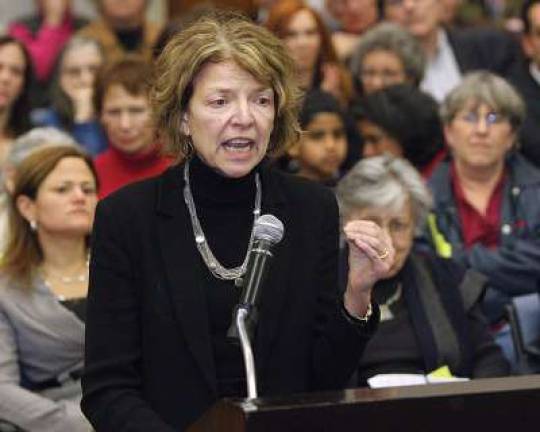CB7 Gives Big Boxes the Boot

Last Tuesday night, dozens of supporters and a fair number of detractors showed up at Community Board 7's meeting to express their views on the proposed retail rezoning initiative for the Upper West Side. The proposal from the City Planning Commission would limit storefront widths along certain sections of Broadway and Amsterdam and Columbus avenues in an effort to encourage small, individually owned "mom-and-pop" shops and keep big banks and chain stores out. Several small business owners came to speak in support of the measure. Bruce Stark, one of the owners of Beacon Paint on Amsterdam Avenue between 77th and 78th streets, said that his family's hardware store has been in the neighborhood for 112 years and he hopes that the rezoning will allow them to stay another 112 years. "This is a very important [thing] for me, because what would stop my landlord from saying, you know, 'Let's take that store and the one next to it and the one next to it and make one big store and triple the rent,'?" Stark said. Monica Blum, president of the Lincoln Square BID, came to beg the board not to approve it for fear that it may come to her district next and to defend the big box stores others were railing against. "We think drugstores [like Duane Reade] today are the five-and-dimes of the past," Blum said, a comment that elicited boos from the crowd. She continued, stating that large, established chains are better, more stable bets for landlords to rent to, and said that the BID fears that this zoning would lead to empty retail chains. Barbara Adler, president of the Columbus Avenue BID, asked the board to amend the proposal to exclude their area, a move that the board considered but ultimately rejected. Anne Shirazi spoke to represent the West 100th Street Block Association, and testified that she and her neighbors support the proposal because they see too many small businesses ousted in favor of larger retail outlets. "Columbus Avenue is like a New Jersey mall," Shirazi said. "It's not a neighborhood. We must pass zoning to protect what is left of small independent businesses." Another resident, John Davenport, said that with more zoning restrictions in place, the Upper West Side could resemble other desirable areas of Manhattan. "I love going to the West Village, and I can't imagine what the West Village would look like if it weren't zoned," Davenport said, urging the board to go "against the moneyed interests" opposing the zoning. Mike Watson, an Upper West Side resident since 1983, said that he supported the move to preserve the small businesses that offer a level of customer service that bigger stores can't. Others spoke about how small businesses often contribute to the neighborhood by sponsoring Little League teams and participating in Safe Haven programs for kids. Some warned that the proposal would do nothing to actually protect the beloved small shops. "Contextual zoning doesn't lower rents, it doesn't prevent someone from being kicked out of their space, it doesn't protect anyone from higher costs," said resident Alexander Medwedew. "There's too much competition for the same amount of space." He advocated opening up other areas for small business instead of changing the currently zoned areas. Ultimately, the board approved the proposal after considering and rejecting an amendment to carve out individual landmarks. They did, however, adopt an amendment asking the City Planning Commission to adhere to a 90-day time limit in approving variances to the zoning for existing small businesses. The proposal will now move to Manhattan Borough President Scott Stringer's office for the next phase of approvals, and the City Planning Commission will hold a public hearing on it April 11 to hear community concerns.